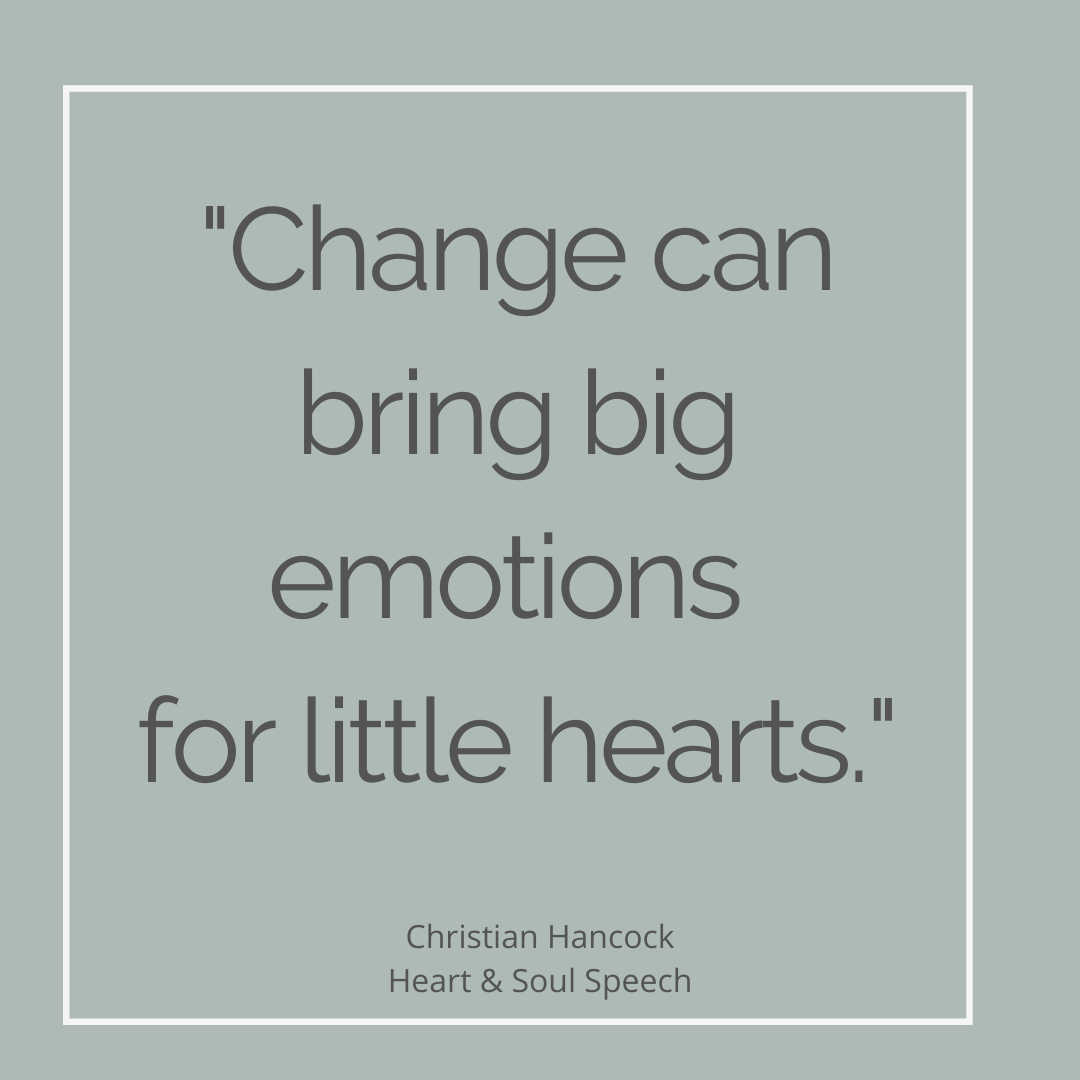All children will experience change in their lives, whether it’s a new sibling, a different school, or just learning to become more independent. Often, these transitions can cause big feelings in their little hearts. How we respond and support children in these moments set the foundation for their development and positive relationships later in life.
Children experience the same range of emotions as adults, but have immature self-regulation skills and developing ability to describe and process those feelings. As a result, they often use limit-pushing behaviors to express themselves. Outbursts, meltdowns, aggression, or withdrawal are common responses to changes in children’s lives. Children with language delays, decreased social skills, or sensory processing deficits often have particular difficulties with changes in their environment.
Parents and caregivers are especially important in supporting young children during big changes in their life. Communication with Connection leads us to acknowledge their feelings, understand their response as typical development, and create a safe and loving space for them to adjust in their new environment.

Developing Emotional Competence
Emotional competence is the ability to understand your feelings, express them appropriately, and self-regulate your emotions. It is a skill that must be practiced in a reassuring and comforting environment for success.
Adjusting to change can involve feelings such as frustration, sadness, excitement, confusion, anxiety, fear, anger, or betrayal. Children’s reactions and the strategies they use to cope are related to their inability to use language to express themselves more appropriately. Children need support as they learn to control their response to change and process their feelings in healthy ways.
It is important to remember children’s limited understanding and use of emotional vocabulary is typical development, and therefore their immature response to change is also developmentally appropriate. Research also indicates children of all ages may display regressive behavior for a few days or weeks during or after transition, such as bedwetting or thumb sucking for children who have outgrown that behavior prior to the change.
Practicing Resiliency
Coping with change requires flexibility and resiliency, which are essential skills needed for positive development. Individuals will respond to change differently based on their temperament, resiliency, and past experiences. While one child may transition smoothly, another may need more support for success. Children benefit from opportunities to learn how to adapt to social situations and manage relationships, how to compromise, express their emotions appropriately, and work through adversity and disappointment. Positive experiences of coping with small daily changes will help them face the bigger transitions more independently in the future. Additionally, studies show resilience in childhood contributes to mental health later in life.
Ways to Support Children through Change
We can support children through transition through our actions (or rather reactions) and words.
Our Reactions:
• Understand a child’s ability to self-regulate and express their emotions is still developing. Their behavior in response to change may be developmentally appropriate and even expected. Screaming, meltdowns, and ‘tantrums’ are age-appropriate ways of expression for young children.
• Allow your child to grieve what used to be, and model ways to move forward.
• Respond predictably and consistently to your child’s needs.
• Offer age-appropriate comfort when needed.
Our Words:
• Acknowledge a child’s feelings and desires, no matter how unreasonable they may seem.
• Reassure children their feelings are normal and we are there with them, committed to staying connected.
• Share your own feelings about change.
• Prepare children for what will happen next.
Let’s see how these strategies could work for a young child with a new sibling at home.
“Today was tough. Baby brother needed me a lot, and you didn’t get as much attention as you wanted. You screamed because you felt frustrated and sad. I’m sorry; I feel sad too. We used to have more time together. Being a big sister is hard. You didn’t ask to be a sister. It’s okay if you don’t like being a big sister right now. Baby brother will grow to be big like you soon and you can play together. I love you very much. I really enjoyed playing ball together. That was so fun. We can play again after baby goes to bed.”
Children are more likely to feel confident and secure through transition when caregivers offer responsive and meaningful interactions in times of stress. With time, practice, and patience, children will start to manage their emotions more independently and be better prepared to survive change.
Read more about emotional competence and ways to support children in difficult times.

One Response